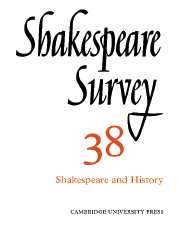Book contents
- Frontmatter
- Shakespeare’s History Plays: 1952–1983
- Shakespeare and History: Divergencies and Agreements
- Shakespeare’s Georgic Histories
- The Nature of Topicality in Love’s Labour’s Lost
- The Tragic Substructure of the Henry IV Plays
- Hal and the Regent
- The Rite of Violence in I Henry IV
- The Fortunes of Oldcastle
- Hand D in Sir Thomas More: An Essay in Misinterpretation
- Livy, Machiavelli, and Shakespeare’s Coriolanus
- Henry VIII and the Ideal England
- The Strangeness of a Dramatic Style: Rumour in Henry VIII
- ‘Edgar I Nothing Am’: Figurenposition in King Lear
- ‘Very like a whale’: Scepticism and Seeing in The Tempest
- Shakespeare’s Medical Imagination
- Shakespeare in the Theatrical Criticism of Henry Morley
- Shakespeare Performances in Stratford-upon-Avon and London 1983–4
- The Year's Contributions to Shakespearian Study 1 Critical Studies
- 2 Shakespeare’s Life, Times and Stage
- 3 Editions and Textual Studies
- Index
The Rite of Violence in I Henry IV
Published online by Cambridge University Press: 28 March 2007
- Frontmatter
- Shakespeare’s History Plays: 1952–1983
- Shakespeare and History: Divergencies and Agreements
- Shakespeare’s Georgic Histories
- The Nature of Topicality in Love’s Labour’s Lost
- The Tragic Substructure of the Henry IV Plays
- Hal and the Regent
- The Rite of Violence in I Henry IV
- The Fortunes of Oldcastle
- Hand D in Sir Thomas More: An Essay in Misinterpretation
- Livy, Machiavelli, and Shakespeare’s Coriolanus
- Henry VIII and the Ideal England
- The Strangeness of a Dramatic Style: Rumour in Henry VIII
- ‘Edgar I Nothing Am’: Figurenposition in King Lear
- ‘Very like a whale’: Scepticism and Seeing in The Tempest
- Shakespeare’s Medical Imagination
- Shakespeare in the Theatrical Criticism of Henry Morley
- Shakespeare Performances in Stratford-upon-Avon and London 1983–4
- The Year's Contributions to Shakespearian Study 1 Critical Studies
- 2 Shakespeare’s Life, Times and Stage
- 3 Editions and Textual Studies
- Index
Summary
Hotspur is a character whose career runs the gamut of dramatic expression. Commencing on a note of furious, even farcical, comedy, it concludes on a note of tragic grief so poignantly realized as to have inspired Northrop Frye’s perception that his dying remark, ‘thoughts, the slaves of life’, comes out of the heart of the tragic vision. Hotspur’s brave death is placed squarely and deliberately before the audience and provides the final means by which they can comprehend the nature and meaning of his life. Gradually the character has been moulded and determined by forces and events that culminate in the great encounter between himself and Prince Hal. The forces, both those seen by and those hidden from Hotspur, are the means by which the audience and reader are able to apprehend the development of a character whose existence has been bent into the shape of tragic suffering shown by that last speech:
O Harry, thou hast robb'd me of my youth!
I better brook the loss of brittle life
Than those proud titles thou hast won of me;
They wound my thoughts worse than thy sword my flesh:
But thoughts, the slaves of life, and life, time's fool,
And time, that takes survey of all the world,
Must have a stop. O, I could prophesy,
But that the earthy and cold hand of death
Lies on my tongue: no, Percy, thou art dust,
And food for -
(1 Henry IV, 5.4.76-85)
- Type
- Chapter
- Information
- Shakespeare Survey , pp. 77 - 84Publisher: Cambridge University PressPrint publication year: 1986

